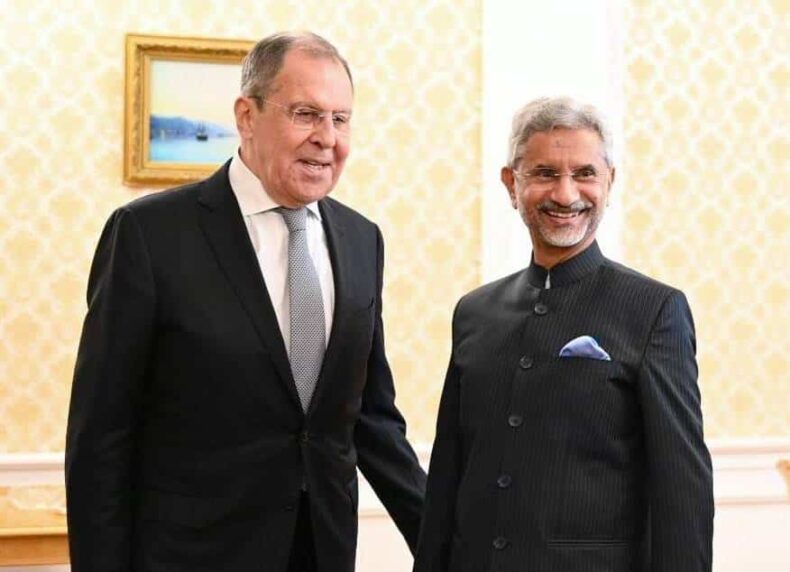The Minister of External Affairs, Jaishankar’s visit to Moscow emphasizes an all-weather nature of India-Russia relations despite differences on the Ukraine war. As the External Affairs Minister put it, if it is a partnership that works to India’s advantage, it is in India’s interest to keep the relationship going.
It was seen that the talks between the two sides covered a range of issues like economic bilateral and trade issues and regional and international developments. As Russian Foreign Minister Sergey Lavrov noted, Russia-India trade has jumped over 170% over the previous year to $17 billion.
The India visit to Russia
External Affairs Minister S Jaishankar arrived in Moscow on 7th November after he last visited Russia in July 2021.
This major visit by External Affairs Minister S. Jaishankar to Moscow has signaled a high-level dialogue that despite India’s reluctance to stand with Russia on Ukraine’s war, the ever-historical friendship between the two sides remains in an effective and honest position.
The visit has provided a symbolic ground for India, stating that Russia is an important bilateral partner for it. While both parties aim to expand their economic cooperation, the West closely watches their advancement with the U.S.A. suggesting India to decrease its dependence on Russia over time.
Delhi also believes Russia has a crucial role to play in global security and stability. Russia will also participate in the ‘Moscow format’ dialogue on Afghanistan next week. India is adamant that it will not link its relationship with Russia to the ‘no-limits‘ Russia-China partnership and balance its ties with the two superpowers.
The two sides demonstrated a certain level of confidence in their talks and exchanges about the war, with Jaishankar reiterating PM Narendra Modi’s words to Russian President Vladimir Putin at Samarkand that this era is not one of war and one needs to cooperate together for respecting UN’s views on peace.

The External Affairs Minister’s remarks that the war is causing pain in the global South, and that both Ukraine and Russia must find an end to this war through dialogue and diplomacy is likely to find resonance and advocacy across the world.
All countries, huge and small, developed and developing are suffering from the energy shock that the war has ushered in and are making their plans for economic recovery after the crippling effects of a disastrous pandemic.
Read More: https://tdznkwjt9mxt6p1p8657.cleaver.live/indias-electricity-renewable-resources/
India and Russia seek a polycentric world with Delhi classifying on more pressing and strategic areas of interest and timely cooperation. Next month, India will assume the presidency of the G20 for the coming year, and dealing with the economic impact of the war is likely to form a significant part of its agenda.
Jaishankar’s other message indicates that India acts as a bridge between the warring parties and would prevent anything that would further complicate or risk the global economy. Restoring stability may have been purposely attributed to the visit in some sections. But he was perhaps being realistic about the limits of what Delhi can do, and also seemed to be placing the onus for ending the war on the two parties, including Europe and the U.S.A.
Russia-India Trade
Against the backdrop of the sanctions imposed by the West, the two parties will focus on improving trade and investments, transport and logistics, use of national currencies in mutual settlements and promising projects in the energy sector, especially in the Arctic shelf and the Russian Far East, according to a Russian foreign ministry statement.
Apart from military-technical, humanitarian, scientific and technical sectors, most of the bilateral talks comprised of oil imports by India.
India becomes Russia’s largest oil customer after China and besides the trade imbalance that this has created, Delhi has not yet been able to convince Moscow to accept rupee payments.
Lavrov’s remarks that both sides had detailed discussions about military and technical cooperation including joint production of weaponry belie assessments indicate that India is a developing country with demanding needs in the field of economic and military ties.

While India tries its best to stay in touch with Russia, such ventures may not be what India’s western partners, including the US would desire to hope from India’s administration. But as the External Affairs Minister put it, if it is a partnership that works to India’s advantage, it is in India’s interest to keep it going.
Following the cold war, it would be interesting to note down and predict India’s reorientation of its relation with the two giant rivals, Russia and the U.S.A over the past 25 years.













